PrestaShop Google Merchant Center Feed
Mit diesem Modul können Sie einen XML / CSV-Feed mit Produkten für Google Merchant Center erstellen. Mit diesem Addon können Sie den Feed-Inhalt dank der Optionen während des Exportvorgangs personalisieren. Das Addon erstellt zwei Arten von Feeds: herunterladbare Datei oder online verfügbaren Feed für geplantes Abrufen. Es exportiert sowohl Produkte als auch Kombinationen (alle Produktvarianten).
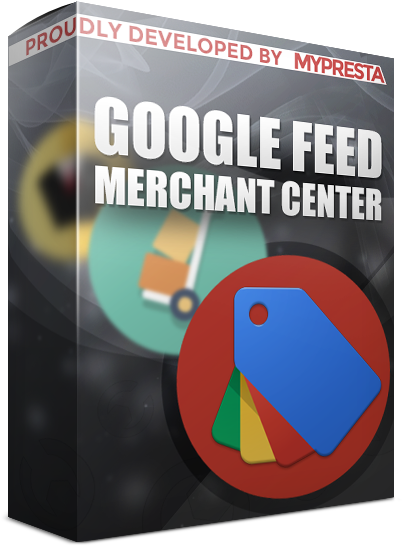
Galeria

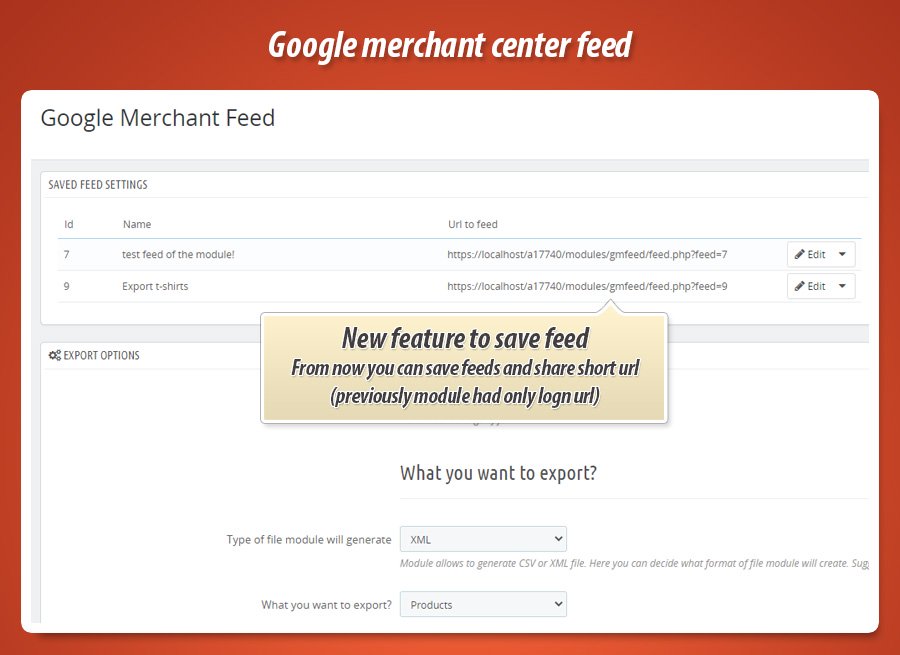
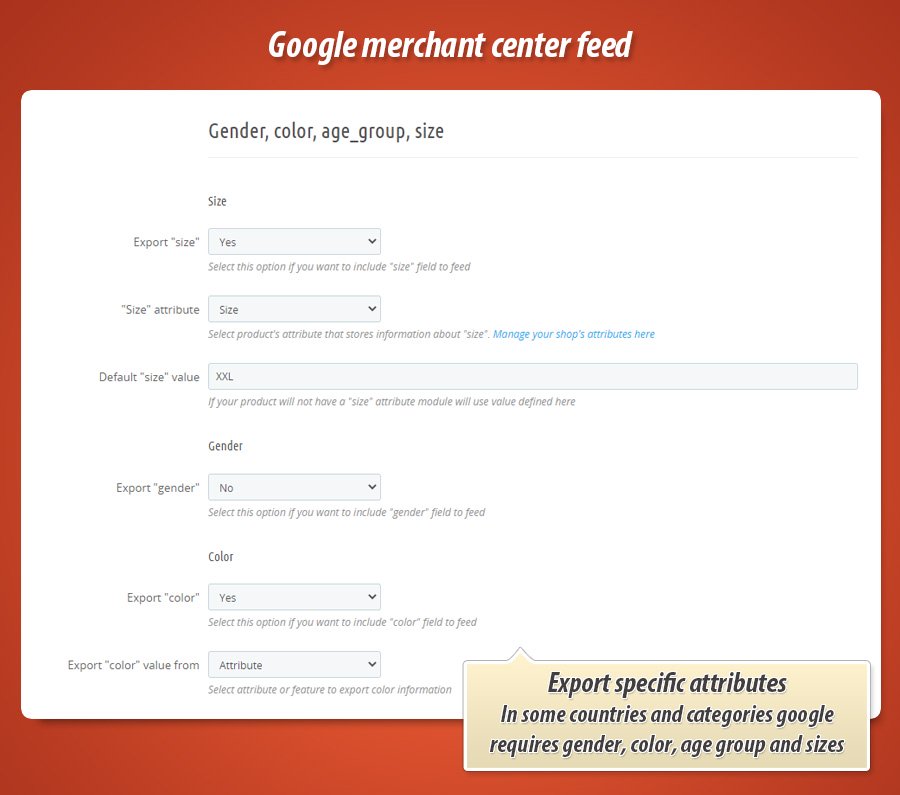
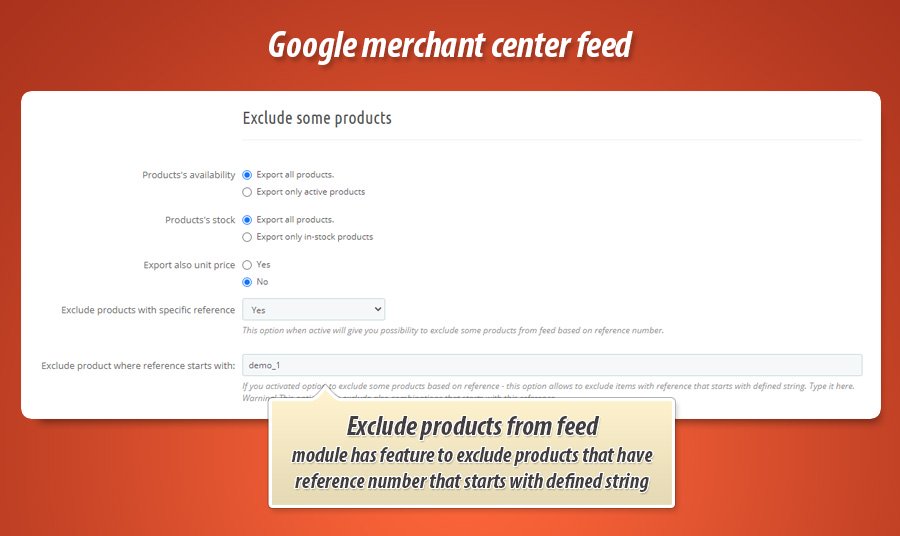
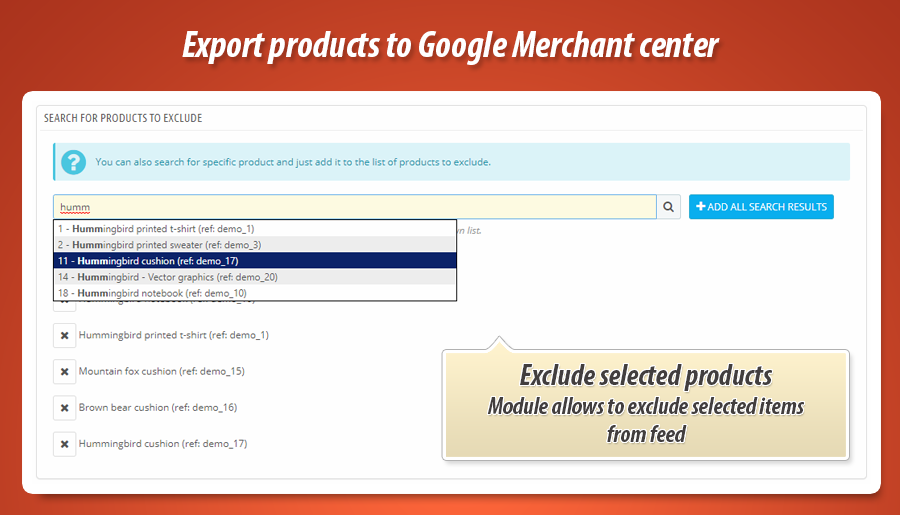
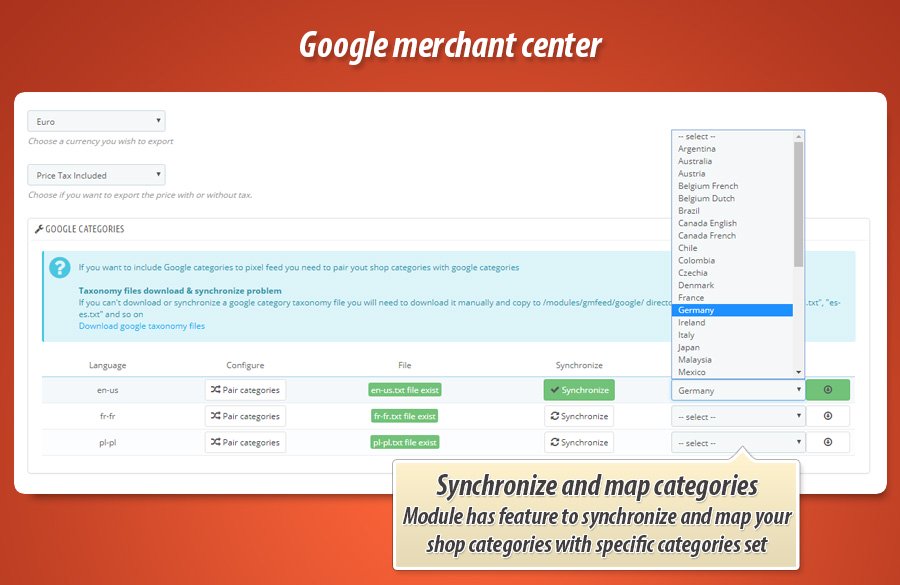
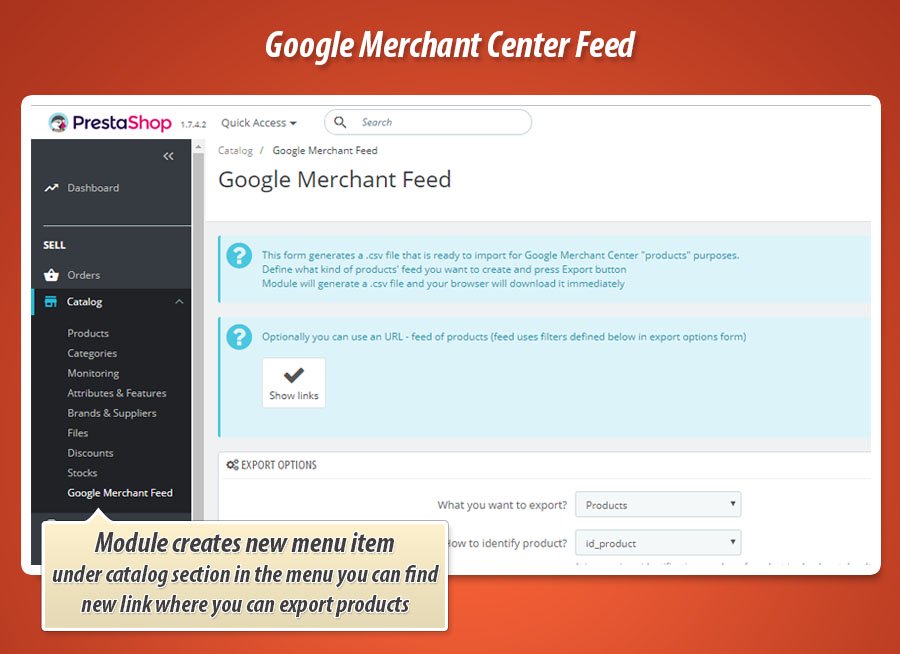
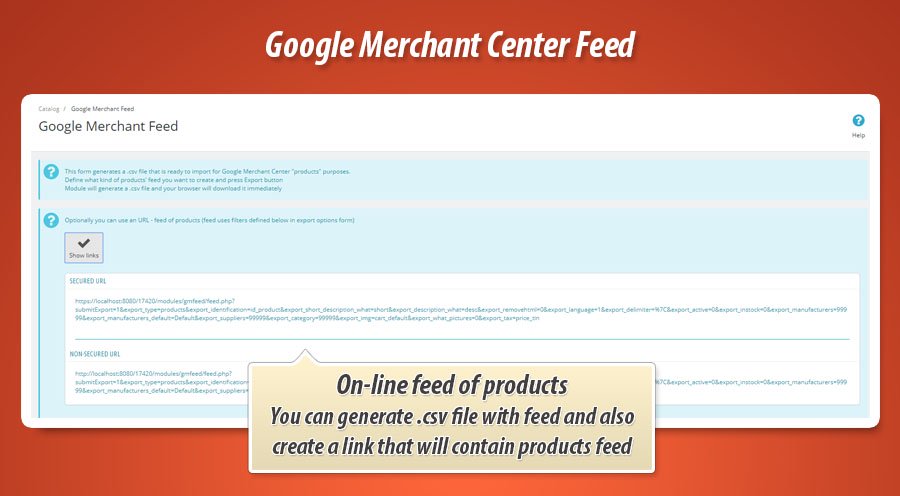
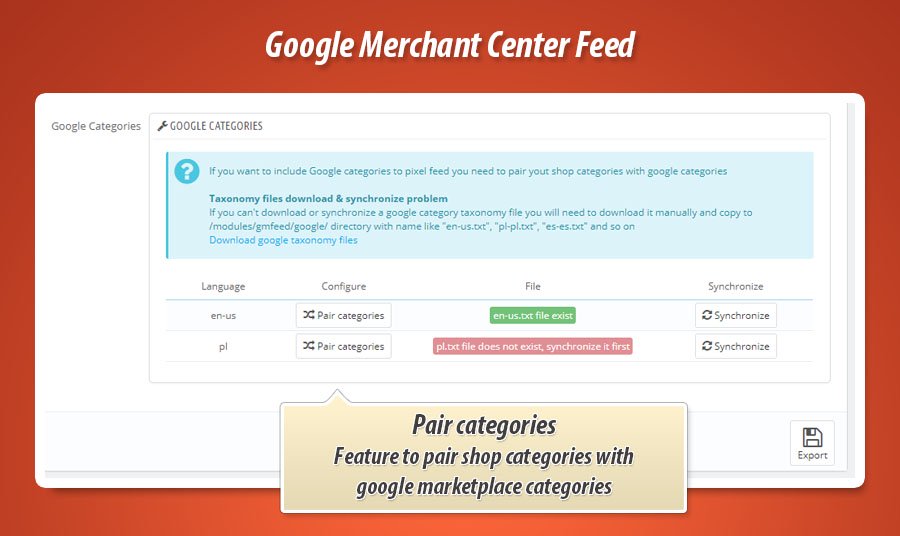
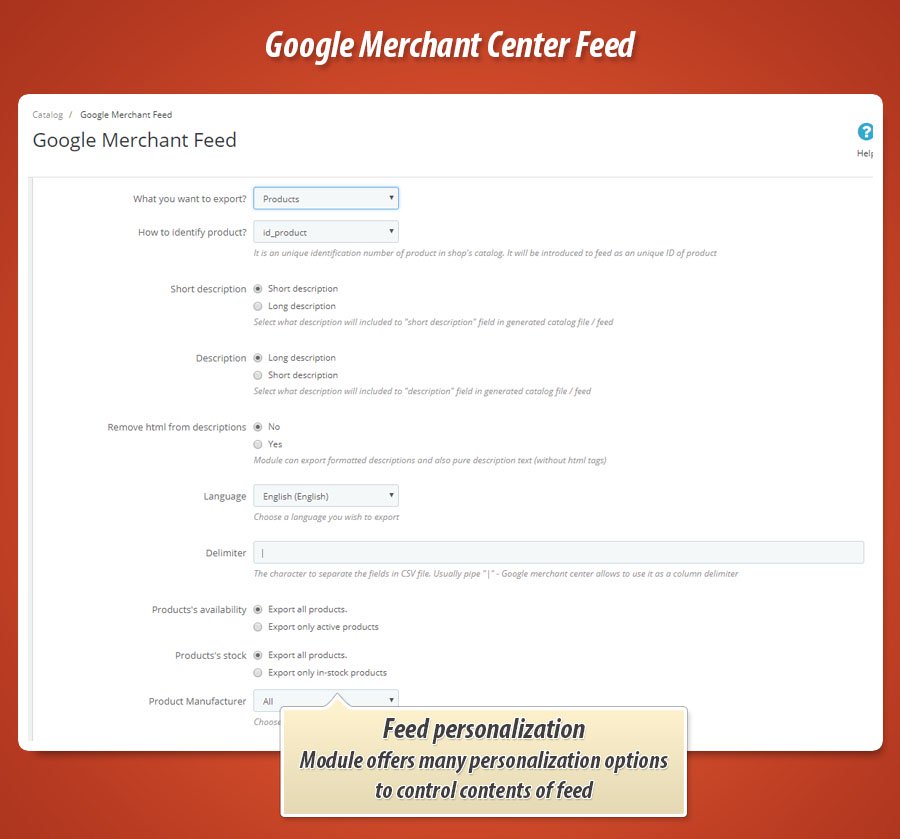
Google Merchant Center & Shopping Produktfeed
Das PrestaShop-Modul bietet ein umfassendes Tool für den Export von Produkten zum Google Merchant Center. Es ermöglicht die Generierung von XML- oder CSV-Dateien mit vollständigen Produktdaten, einschließlich Kombinationen, für eine effektive Präsentation bei Google Shopping. Es stehen zwei Exportmethoden zur Verfügung: ein einmaliger Dateidownload oder ein dynamischer Online-Feed, ideal für geplante Aktualisierungen. Das Modul gewährleistet eine erweiterte Konfiguration, die eine präzise Festlegung der exportierten Daten ermöglicht: von Produkttypen und eindeutigen Kennungen bis hin zu Attributen wie Farbe, Größe, Verfügbarkeit oder Preisen, sowie die Zuordnung zu Google-Kategorien. Eine unschätzbare Lösung für eine effektive Produktpräsenz im Google-Ökosystem.
Wie Sie bereits wissen, ist dies ein Modul für PrestaShop, das ein "Export"-Tool bietet. Dieses Export-Tool erstellt einen XML- oder CSV-Feed mit Produkten für Zwecke des Google Merchant Center. Vereinfacht gesagt können Sie mit diesem Addon Produkte (mit Kombinationen!) einfach auf den Google-Marktplatz exportieren.
| Zwei Exporttypen | |||
| Export in Datei | Online verfügbarer Produkt-Feed | ||
| Dies ist eine manuelle Methode zur Feed-Generierung. Sie ist auf der Feed-Verwaltungsseite im Shop-Backoffice verfügbar. Sie legen dort die Einstellungen des Feeds fest und das Modul generiert die Datei und lädt sie auf Ihren Personal Computer herunter. | Dies ist eine Exportmethode, die eine spezielle URL mit Exportparametern erstellt. Das Öffnen dieser URL in Ihrem Browser generiert einen Produkt-Feed mit definierten Einstellungen. Sie können dies verwenden, wenn Sie die Produkte im Merchant Center von Zeit zu Zeit mit einem geplanten Abruf aktualisieren möchten. | ||
| Zwei Exportdateiformate | |||
| Export in Datei | Online verfügbarer Produkt-Feed | ||
| XML | CSV | XML | CSV |

Dank der Funktion zum Speichern von Feed-Einstellungen kann der exportierte Feed automatisch von Googles geplantem Abruf generiert und heruntergeladen werden.
Sie können das Modul auch so konfigurieren, dass der Feed in einer Datei im Modulverzeichnis gespeichert wird (z. B. wenn Sie einen Cron-Job ausführen und den Feed speichern möchten).

Konfiguration des Feeds
Dieses Modul zum Exportieren von Produkten für Zwecke des Google Merchant Center ermöglicht die bequeme Personalisierung des Feeds. Während der Konfiguration des Exports im Shop-Backoffice können Sie verschiedene Optionen auswählen. Diese Optionen beschreibe ich unten.
Dateityp, den das Modul generiert
Das Modul ermöglicht die Generierung von CSV- oder XML-Dateien. Hier können Sie entscheiden, welches Dateiformat das Modul erstellen wird. Empfohlen: leichtgewichtige CSV
Was möchten Sie exportieren?
Das Modul ermöglicht den Export von Produkten (ohne Kombinationen) oder allen Produktvarianten (Kombinationen)
Produkttyp
Die Funktion zum Einbeziehen des Produkttyps in den Feed wurde hinzugefügt - Sie können sie aktivieren oder deaktivieren.
Verwenden Sie das Attribut Produkttyp, um Ihr eigenes Produktkategorisierungssystem in Ihre Produktdaten aufzunehmen.
Wie soll das Produkt identifiziert werden?
Sie können entscheiden, wie das Modul die ID des Produkts definieren soll. Es kann die ID des Produkts, die ID der Kombination oder beides id_product-id_combination sein. Eine großartige Möglichkeit, die Produkte im Feed leicht zu unterscheiden.
Geschlecht, Altersgruppe, Farbe, Größe
In einigen spezifischen Ländern und für einige spezifische Produktkategorien (wie Kleidung) ist es erforderlich, Informationen über Produktattribute wie Farbe, Größe usw. im Feed zu senden. Unser Modul bietet Ihnen die Möglichkeit, diese Felder dynamisch in den Feed aufzunehmen, basierend auf Zuordnungen zwischen Produkt und Merkmalen oder direkt aus den Produktattributen (wenn Produkte Kombinationen haben).

Eindeutige Produktkennung für Zwecke des Google Merchant Center
Eindeutige Produktkennungen definieren das Produkt, das Sie auf dem globalen Markt verkaufen. Sie unterscheiden eindeutig die von Ihnen verkauften Produkte und helfen dabei, Suchanfragen mit Ihren Angeboten abzugleichen. Eindeutige Produktkennungen werden vom Hersteller jedem Produkt zugewiesen. Wenn Sie also dasselbe Produkt wie ein anderer Händler verkaufen, sind die UPIs identisch. Im Google Merchant Center Feed wird dies als "GTIN" (Global Trade Item Number) bezeichnet. Das Modul ermöglicht die Auswahl der UPC-Barcode-Nummer, der EAN13-Barcode-Nummer oder der Referenznummer.
Kurzbeschreibung
Sie können entscheiden, ob das Modul eine Kurzbeschreibung in den Produkt-Feed aufnimmt.
Beschreibung
Sie können entscheiden, ob das Modul eine Standardbeschreibung in den Feed aufnimmt.
HTML aus Beschreibungen entfernen
Das Modul ermöglicht das Entfernen von HTML-Sprache aus der Beschreibung. Der Feed enthält also nur reinen Text.
Sprache des Feeds
Sie können auswählen, welche Sprache zur Erstellung eines Produkt-Feeds verwendet wird (damit alle Produktnamen, URLs zu Produkten usw. in der ausgewählten Sprache sind).
Produktverfügbarkeit im Lager
Sie können nur Produkte exportieren, die auf Lager sind, oder alle.
Produktverfügbarkeit
Sie können alle Produkte (auch inaktive Produkte) oder nur aktive Produkte exportieren.
Informationen zum Lagerbestand
Sie können echte Lagerbestandsinformationen einbeziehen, für alle Produkte die Information "auf Lager" einfügen, auch wenn einige nicht auf Lager sind, für alle Produkte die Information "nicht auf Lager" einfügen, auch wenn einige auf Lager sind.
Produkthersteller
Sie können Produkte von ausgewählten Herstellern exportieren.
Standardherstellerwert
Wenn Ihre Produkte keinem Hersteller zugeordnet sind (dies ist für Zwecke des Google Merchant Center Feeds erforderlich), können Sie den Standardwert des Herstellerfeldes definieren, sodass Sie dort Ihre eigene Marke eintragen können.
Produktlieferant
Sie können Produkte nur von ausgewählten Lieferanten exportieren.
Produktkategorie
Sie können Produkte nur aus ausgewählten Kategorien exportieren.
Bildgröße für Produktbilder
Sie können entscheiden, welches Bildformat im Feed verwendet werden soll. So können Sie die Qualität der Bilder und die Größe (Breite und Höhe des Bildes) steuern, um Fehler vom Google Merchant Center Feed Validator zu vermeiden.
Währung
Sie können entscheiden, welche Währung in den Produkt-Feed aufgenommen wird.
Produktpreis
Das Modul ermöglicht es, über den Preis zu entscheiden, der exportiert wird. In PrestaShop können die Produktpreise je nach Währung, Kundengruppe, Land usw. variieren. Das Modul ermöglicht es, genau zu entscheiden, welcher Preis nach Währung, Land, Kundengruppe, spezifischen Preisen usw. exportiert wird.
Google-Kategorien
Das Modul verfügt über ein fantastisches Werkzeug zur Zuordnung Ihrer Shop-Kategorien zu den Google Merchant Center Feed-Kategorien.
Funktion zur Anzeige Ihrer Produkte auf lokalen Oberflächen auf Google
Das Modul verfügt über Optionen zum Einbeziehen des Store-Codes in den Feed. Dank dessen wird er auf unbezahlten Produktlisten auf Google-Oberflächen verfügbar sein, einschließlich Google Search, Google Images, Google Shopping, Google Maps und Google Lens.
Modulgalerie










Warum unser Modul wählen
Google Merchant Center Feed?
Optimierung und Automatisierung
Dieses Modul automatisiert und optimiert den Export Ihrer PrestaShop-Produkte zum Google Merchant Center. Es erstellt automatisch XML- oder CSV-Feeds, ermöglicht geplante Abrufe durch Google und bietet umfangreiche Konfigurationsmöglichkeiten zur präzisen Anpassung Ihrer Produktdaten für eine effiziente Listung.
Gesteigerter Umsatz
Dieses Modul steigert Ihren Umsatz durch den effizienten Export von Produkten auf Google Merchant Center und lokale Oberflächen. Es gewährleistet präzise Produktinformationen, dynamische Attribute und optimale Sichtbarkeit durch automatische Feed-Updates und einstellbares Preismanagement, um mehr Kunden zu erreichen und die Konversionsraten zu erhöhen.
15 Jahre Erfahrung
Unser Modul reflektiert 15 Jahre Erfahrung in der Bewältigung komplexer PrestaShop-Produktdaten und Google Merchant Center-Anforderungen. Es bietet präzise Steuerung über Produktkombinationen, individuelle Preise, Kategorienzuordnung und alle notwendigen Attribute, um Ihre Produkte fehlerfrei bei Google zu listen.
Umfangreiche Anpassung
Dieses Modul bietet umfangreiche Konfigurationsoptionen für Ihren Google Merchant Center Feed. Passen Sie Dateityp, Produktvarianten, Beschreibungen, Preise, Bildgrößen, Sprache, Währung und Filter nach Kategorie oder Hersteller an. So erzielen Sie eine präzise Anpassung an Ihre Anforderungen.
Open Source Code
Das Modul bietet vollen Zugriff auf den Quellcode, was Ihnen die Freiheit gibt, es an Ihre spezifischen Bedürfnisse anzupassen. Keine Verschlüsselung, volle Transparenz für fortgeschrittene Anpassungen und nahtlose Integrationen in Ihre PrestaShop-Umgebung.
Lizenz und Updates
Die Modullizenz ermöglicht Ihnen die zeitlich unbegrenzte Nutzung. Kostenlose Updates sind für ein ganzes Jahr enthalten, um Kompatibilität und aktuelle Google Merchant Center Anforderungen zu gewährleisten. Danach sind stark vergünstigte Verlängerungen für den Zugang zu Updates möglich.



























